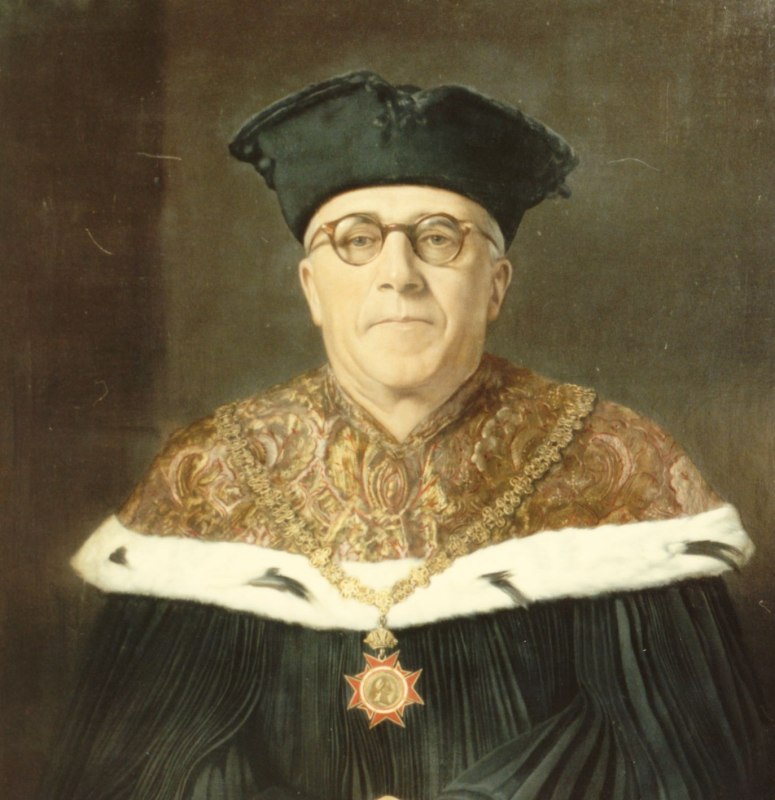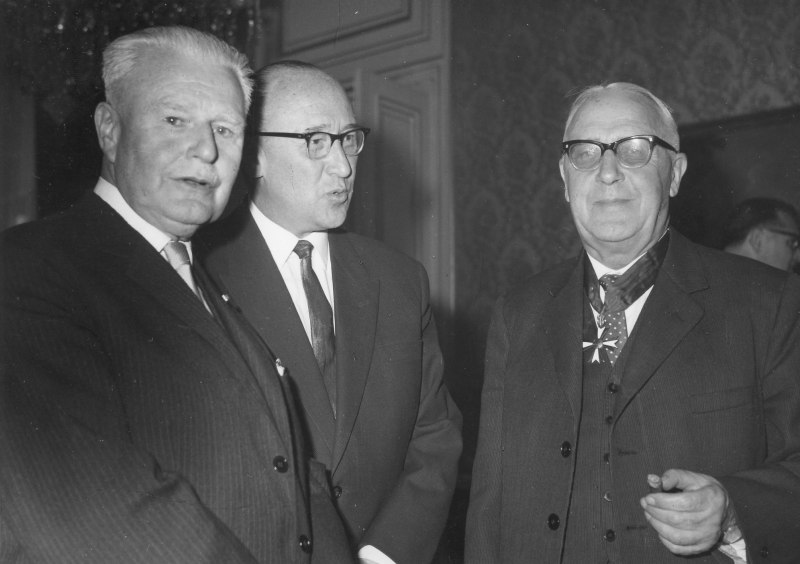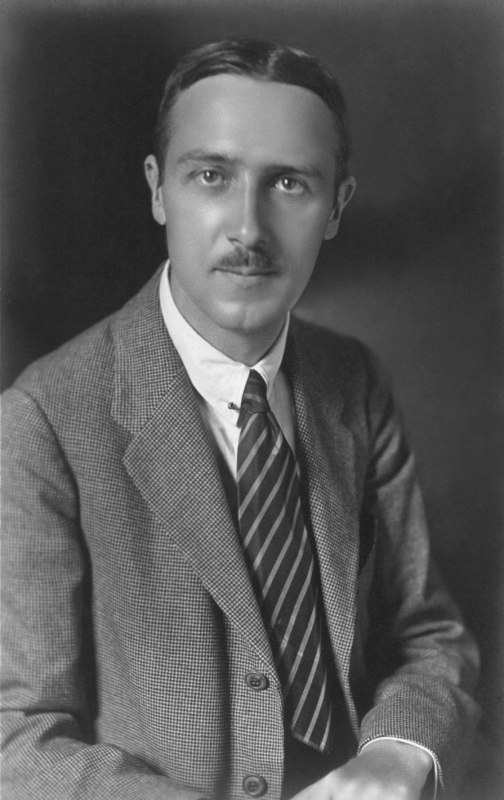Alfred Verdroß-Droßberg, Prof. Dr. Dr. h.c. mult.
1958–1977 Judge of the Hague Court of Arbitration, 1959–1977 Judge at the European Court of Human Rights and 1957–1965 Member of the United Nations International Law Commission
Ehrungen
| Ehrung | Titel | Datierung | Fakultät | |
|---|---|---|---|---|
| Ehrensenator*in | sen. h.c. | 1960 | Rechts- und Staatswissenschaftliche Fakultät |
|
| Ehrendoktorat | Dr. theol. h.c. | 1961 | Katholisch-Theologische Fakultät |
|
| Tor der Erinnerung | 1998/99 | Rechtswissenschaftliche Fakultät |
|
The honors are classified as "worthy of discussion" in 2022/23 due to Alfred Verdroßʼ close relationship to National Socialism. Verdroß was never a member of the NSDAP, but sympathized with National Socialism early on, was involved in illegal NSDAP circles even after the NSDAP was banned and maintained contacts with party members. He openly declared his nationalist as well as Christian-Catholic views, was therefore extremely popular among German nationalist and National Socialist students and intervened on their behalf on several occasions.
After the Anschluss, he was briefly suspended from his post in the summer of 1938, but was allowed to resume his lectures on international law from July 1939. However, his license to teach philosophy of law was revoked. He managed to come to terms with the NSDAP government and adapted to National Socialist ideas on international law.
As Verdross had never belonged to the NSDAP, he was able to continue his career after the end of the Second World War without denazification proceedings.
Funktionen
| Dekan*in | Rechts- und Staatswissenschaftliche Fakultät | 1931/32 |
| Senator | Rechts- und Staatswissenschaftliche Fakultät | 1935/36 |
| Senator | Rechts- und Staatswissenschaftliche Fakultät | 1936/37 |
| Senator | Rechts- und Staatswissenschaftliche Fakultät | 1937/38 |
| Senator | Rechts- und Staatswissenschaftliche Fakultät | 1945/46 |
| Senator | Rechts- und Staatswissenschaftliche Fakultät | 1946/47 |
| Dekan*in | Rechts- und Staatswissenschaftliche Fakultät | 1947/48 |
| Rektor | 1951/52 | |
| Rektor | 1952/53 | |
| Senator | Rechts- und Staatswissenschaftliche Fakultät | 1955/56 |
| Senator | Rechts- und Staatswissenschaftliche Fakultät | 1956/57 |
| Senator | Rechts- und Staatswissenschaftliche Fakultät | 1957/58 |
| Dekan*in | Rechts- und Staatswissenschaftliche Fakultät | 1958/59 |
- Rechtswissenschaften
- Internationales Recht (Völkerrecht)
- Rechtsphilosophie
- Internationales Privatrecht
- Rechts- und Staatswissenschaftliche Fakultät
The son of the Kaiserjägerhauptmann Ignaz Verdross Edler von Drossberg received his doctorate in law from the University of Vienna in 1913. At that time, he was already in judicial training and passed the judges' examination in 1916. After the end of the Danube Monarchy, he became legation secretary at the Austrian legation in Berlin until 1920 and then worked in the international law department of the Federal Ministry for Foreign Affairs from 1920-24, and from 1922 also as a professor at the Consular Academy in Vienna. He was habilitated at the University of Vienna in 1921 with his treatise "Die völkerrechtswidrige Kriegshandlung und der Strafanspruch der Staaten" ("Acts of War in Violation of International Law and the Criminal Claim of States"), and was appointed associate professor of international law, philosophy of law and private international law in Vienna in 1924 and full professor in 1925. He was subsequently a member of the Vienna Faculty of Law until his retirement in 1961.
Involvement in National Socialism
Alfred Verdroß was never a member of the NSDAP, but sympathized with National Socialism early on, was involved in illegal NSDAP circles even after the NSDAP was banned and cultivated contacts with party members. He openly declared his nationalist and Christian-Catholic views and was therefore extremely popular among German nationalist and National Socialist students and intervened on their behalf on several occasions.
After the Anschluss, he was briefly suspended from his post in the summer of 1938, but was allowed to resume his lectures on international law from July 1939. However, his license to teach philosophy of law was revoked. He managed to come to terms with the NSDAP government and adapted to National Socialist ideas on international law.
Post-war period
As Verdross had never been a member of the NSDAP, he was able to continue his career after the end of the Second World War without undergoing denazification proceedings. In 1945, he regained his full academic duties, was appointed full professor in 1947 and became Dean of the Faculty of Law twice (1946/47 and 1958/59) as well as Rector of the University of Vienna in 1951/52. In 1949, he was one of the first lecturers at the internationally oriented Summer School of the University of Vienna. In addition to his university activities, Verdross held numerous high-ranking international positions. He was a member of the International Law Commission of the United Nations from 1957 to 1966 and a judge at the European Court of Human Rights from 1958 to 1977. In 1969, he was President of the United Nations Conference on the Law of Treaties. Until 1977, he was also a member of the Hague Academy of International Law, where he gave lectures. Together with Hans Kelsen and Adolf Merkl, Verdross is regarded as one of the founders of the "Vienna School", which "broke new ground in legal philosophy worldwide". Of his extensive oeuvre, his works on "Austria's Perpetual Neutrality" and his life's work "International Law" (5th ed. Vienna 1964), which is regarded as the leading German-language standard textbook on the subject, and his "Abendländische Rechtsphilosophie" (2nd ed. 1963) are particularly noteworthy.
On an international level, Alfred Verdross is one of the most respected scholars of international law of the 20th century.
Honors
Alfred Verdross received numerous high honors. He was elected Honorary Senator of the University of Vienna (1960), received honorary doctorates from the universities of Paris, Salamanca, Frankfurt and Thessaloniki, the Doctor theologiae honoris causa from the University of Vienna and the Doctor philosophiae honoris causa from the University of Salzburg. He was a member (since 1928), since 1977 honorary member of the Institut des Droit International, of which he was president from 1959 to 1961, and since 1950 he was a full member of the Austrian Academy of Sciences. He was awarded the Grand Decoration of Honor in Silver for Services to the Republic of Austria in 1954, the Austrian Decoration of Honor for Science and Art in 1959 and the Ring of Honor of the City of Vienna in 1960. On his 90th birthday in 1980, he was awarded the Grand Decoration of Honor in Gold with Star for Services to the Republic of Austria.
At the University of Vienna, he was also honored in 1998 by the naming of one of the "Gates of Remembrance" on the campus of the University of Vienna (Verdross Gate, passageway from court 3 to court 5).
Zuletzt aktualisiert am 07.10.2024 - 21:46
-

Alfred Verdroß (Verdross) (1890–1980), Law, rector 1951/52
-

Members of the faculty of the Summer School of the University of Vienna, 1952
Group picture with members of the faculty of the Summer School of the University of Vienna in 1952. According to the caption: Josef Lehrl, Willibald...
-

Awarding of badge of honor at the Ministry of Education to Albin Lesky, Herbert Hunger and Alfred Verdroß [Verdross]
Ehrenzeichenüberreichung im BMU an Albin Lesky , Herbert Hunger und Alfred Verdroß [Verdross]

